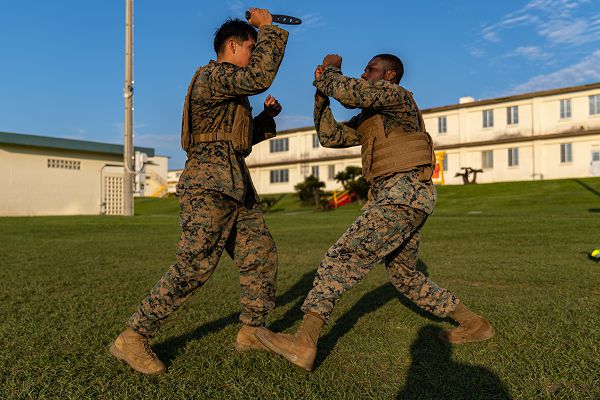
Camp Foster, Okinawa, Japan.(June 9, 2023): It takes a warrior spirit. In this photo by Corporal Kyle Chan, Marine Corporals Alberto Gutierrez (left) and Olayinka Okenmakinde with the 1st Marine Aircraft Wing, battle with knives in simulated combat during the USMC Martial Arts Program (MCMAP).
Every Marine, including air crews, learn marital arts during Basic training and must earn a Tan Belt, the first of a series of belt qualifications. Infantry Marines must earn a Green belt and more advanced combat arms a Gray belt. All are expected to know personal combat/self-defense tactics before getting the chance to attend the MCMAP. Here Marines learn combat conditioning, close-quarter hand-to-hand combat techniques, and morale/team building skills. Students practice ground-fighting, grappling, attacking using bayonets, and they participate in brutal pugil stick bouts. Students also work on physical development, strength, and endurance by practicing in tough simulated combat situations.
The goal is to create more effective fighters by stressing mental character development, including the responsible use of force, leadership, and teamwork. Started in 2001, the MCMAP trains thousands of Marines a year in unarmed combat, edged weapons, weapons of opportunity, and rifle and bayonet techniques.
What sets the MCMAP apart is its intellectual as well as physical focus.
It is one of the few martial arts programs teaching the history of “warrior cultures” like those of the Spartans, Zulus, and the Apache. These studies focus on what produces these martial communities and how these societies harnessed their warrior spirit. American Marines go a step further by insisting on “ethical warriors”, fighters that obey a code of honor, courage, and commitment.


